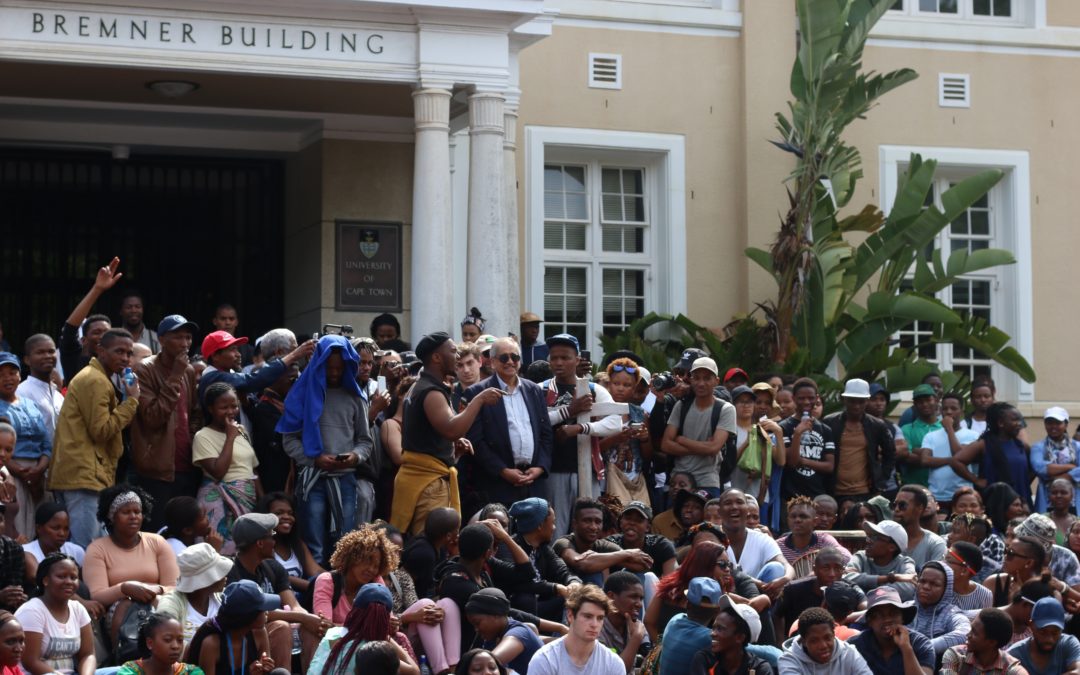#FeesMustFall2016
Hand claps. Whistles. Methodic footsteps and lyrics revealing a deep historical pain erupt from the crowd, commanding the captivated gaze of onlookers.
It is midday on Wednesday, October 5th on the University of Cape Town campus where hundreds of students, university workers and emphatic supporters of the #FeesMustFall2016 movement are gathered in a vibrantly cohesive, buzzing collective of individuals demonstrating their need for fundamental policy changes in the University. A desire for revolution is in the air but, truthfully, the goal is unclear.
Though the true beginning of student-gathered activism in South Africa catalyzed in 1994 with protests led by the South African Student Congress (SASC) inspiring a wave of grassroots defiance against educational policies, South African University protests have resurfaced this year with the #FeesMustFall movement.
Initially, University of Cape Town students gained widespread international attention for their March, 5th 2015 “Rhodes Must Fall” protests. Primary protest demands focused on the removal of a Cecil John Rhodes statue ( the creator of the pre-apartheid labor and tax initiative, The Glen Gray Act) from campus grounds. The Rhodes statue was torn down a month later. However, the campaign didn’t stop there. Ultimately, protesters shifted the conversation to encompass race relations, financial inequalities as well as detrimental educational methodologies and focused on decolonizing the country’s universities. No progress was made, thus resulting in a new protest wave this year.
From Wits to CPUT to UCT, major universities are experiencing an uproar in some form. At University of Cape Town, the scene has remained relatively calm, however, classes were canceled and the university has been forced to acknowledge protester demands.
When the Street Talk Crew arrived to UCT last week with cameras in hand, ready to cover event and speak with those involved, the university appeared peaceful. Students meandered about without any particular haste. However, police presence began casually gathering along the streets. Laughing and chatting, their demeanor was less threatening than it was relaxed.
Only a few hours later, everything shifted.
Multiple persuasive and rousing speeches from the appointed leaders of the #FeesMustFall dissent incited an entire assembly of individuals to take to the campus walkways. Toyi-toyi singing and dancing broke out within the group, some demonstrators waved small tree branches above their heads and one held a white cross at the forefront. From a distance, the accumulation could have appeared to be a lighthearted parade. Yet, it was far from a celebration.
As we moved from the outskirts of campus towards the center, a large scorch mark marring the ground of UCT’s upper campus. Coupled with what appeared to be ashes of paper and trash, the blemish confirmed online reports of arson that had taken place on campus just the night before.
The crowd halted in front of the Steve Beiko building, demanding UCT Principal Max Price’s attention. Police arrived in full gear, helmets and weapons in place, and stared with a stony countenance towards the peaceful group. Throughout the demonstration, a select group of students stood out at the front lines of the marching masses. Their authority in the protest was clear. As a result, we asked to speak with them for our next episode of Street Talk TV.
What ensued was an hour-long conversation between six UCT students that revealed their unanimous rage and pain. The dynamic between the students and the police, who stood only 20 feet away, was shown to be highly tumultuous and further increased anger as the students spoke to us. While our crew held cameras, notebooks and microphones at the ready, we noticed a cluster of protesters intently listening behind us.
At the end of the day, the Street Talk crew looked around at each other, felt the adrenaline of the day vanish and sunk into exhaustion. We agreed that it is easy to allow yourself to be swept up in the passion and power of an oppressed group. Compassion morphs into guilt and subsequent need to aid as well as act. As media, our job is instead to share the story as it unfolds before us. The “Everything Must Fall” episode is our way of distilling the events and adding the crucial conversation that is spreading across the country.
#FeesMustFall is a convoluted issue that lacks a singular solution. In the meantime, violence, property damage and fear mongering from any party cannot be the answer and instead, we can only encourage knowledge, empathy and compromise.
-Angelina Hess
Join The Conversation
[types field=’the-making-of-this-episode’][/types][types field=’the-making-of-this-episode’][/types




